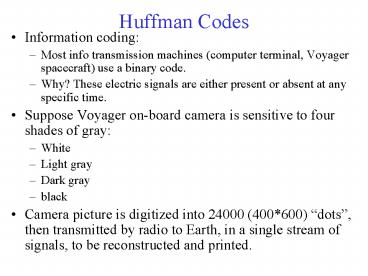Huffman Codes - PowerPoint PPT Presentation
1 / 10
Title:
Huffman Codes
Description:
LG. DG. B. Start at root, follow till leaf is reached. Huffman Codes ... Construct the tree from the leaves to root: 1) label each leaf with its probabilities ... – PowerPoint PPT presentation
Number of Views:47
Avg rating:3.0/5.0
Title: Huffman Codes
1
Huffman Codes
- Information coding
- Most info transmission machines (computer
terminal, Voyager spacecraft) use a binary code. - Why? These electric signals are either present or
absent at any specific time. - Suppose Voyager on-board camera is sensitive to
four shades of gray - White
- Light gray
- Dark gray
- black
- Camera picture is digitized into 24000 (400600)
dots, then transmitted by radio to Earth, in a
single stream of signals, to be reconstructed and
printed.
2
Huffman Codes
- In designing a binary code, we want to decide how
to encode the color of each dot in binary, so
that - 1) No waste of signals (efficiency)
- 2) Recognizable (later)
- Example encode
- White 0001
- Light gray 0010
- Dark gray 0100
- Black 1000
WASTEFUL!! One picture would cost 424000
almost 100 000 signals 4 digits per symbol (dot)
- How many digits do you need?
- 1 not enough, only 2 values
- 2 ok 4 values
- 3 too much
3
Huffman Codes
- Try 2
- W 00
- LG 01
- DG 10
- B 11
Fixed-length code of length 2 (2 yes/no questions
suffice to identify the color) No problem on
receiving end, every two digits define a dot.
Encoding mechanism Decision tree
Start at root, follow till leaf is reached
4
Huffman Codes
- There are other shapes with four leaf nodes
Which one is better? Criterion is weighted
average length
Suppose we have these probabilities
W -- .40 -- 1 LG -- .30 -- 00
DG -- .18 -- 011 B -- .12 -- 010
5
Huffman Codes
- VARIABLE LENGTH CODE
- Weighted average for tree 1
- .402 .302 .182 .122 2
- Weighted average for tree 2
- .401 .302 .183 .123 1.9
- On average, tree 2 is better, costs only
1.924000 45600, less than half of first try.
6
Huffman Codes
- General problem
- Given n symbols, with their respective
probabilities, which is the best tree? (code?) - To determine the fewest digits (yes/no questions
necessary to identify the symbol) - Construct the tree from the leaves to root
- 1) label each leaf with its probabilities
- 2) Determine the two fatherless nodes with the
smallest probabilities. In case of tie, choose
arbitrarily. - 3) Create a father for these two nodes label
father with the sum of the two probabilities. - 4) Repeat 2) 3) until there is 1 fatherless node
(the root).
7
- In our case
So, we have W -- .40 --
1 LG -- .30 -- 01 DG -- .18 -- 001 B --
.12 -- 000
By convention, left is 0, right is 1
Using this method, the code obtained is minimum
redundancy, or Huffman code.
8
Sample Huffman code minimize the average number
of yes/no questions necessary to distinguish 1 of
5 symbols that occur with known probabilities.
1.00
a 01 b 11 c 10 d 001 e 000
0.54
9
- Weighted Average Length
- 2(.28.25.21)3(.15.11) 2.74 3.26
2.26
The Huffman code is always a prefix code. A
prefix code satisfies the prefix condition. A
code satisfies the prefix condition if no code is
a prefix of another code.
10
Example.































